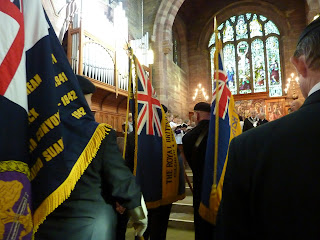On the eleventh hour of the eleventh day of the eleventh month in 1918 the First World War ended. Thousands had died, thousands more had been injured and scarred by their horrific experiences and needed support and practical help when they returned. Civilians wanted to remember the people who had given their lives for peace and freedom,. An American War secretary, Moina Michael, was inspired by John McCrae's poem (In Flanders Fields - see below) and sold poppies to raise money for the ex-Service community and so the tradition began.
In 1922 Major George Howson MC who served in the First World War founded the Disabled Society. He recognised ex service men could make artificial poppies and approached the Legion. He founded a small factory which was later to become The Royal Legion Poppy Factory.
The British Legion - now the Royal British Legion was formed in 1921. The first official Legion Poppy Day was held in Britain on 11 November 1921 and since then the Poppy Appeal has been a key annual event in the nation's calendar.
 |
| British Legion Culcheth & District Branch |
 |
| Parade in Culcheth 2012 |
 |
| Newchurch |
In Flanders' Fields
In Flanders' fields the poppies blow
Between the crosses, row on row,
That mark our place; and in the sky
The larks, still bravely singing, fly
Scarce heard amid the guns below.
We are the dead. Short days ago
We lived, felt dawn, saw sunset glow,
Loved and were loved, and now we lie
in Flanders' fields
Take up our quarrel; with the foe;
To you from failing hands we throw
The torch; be yours to hold it high,
If ye break faith with us who die
We shall not sleep, though poppies grow
In Flanders' fields
(John McCrae 1915)
The first World War caused widespread devastation to areas of Northern France and Belgium, but the poppy flowered every year, bringing colour and hope to the devastated landscape. Colonel John MCrae, a doctor serving witht he Canadian Armed Forces was deeply moved by what he saw and, inspired by the poppies, wrote a poem - In Flanders Fields. McCrae died in a military hospital on the French coast shortly after writing his poem but it was published in Punch magazine, showing the world what conditions on the battlefields were like.


No comments:
Post a Comment